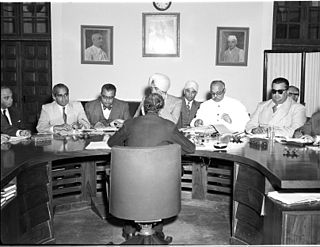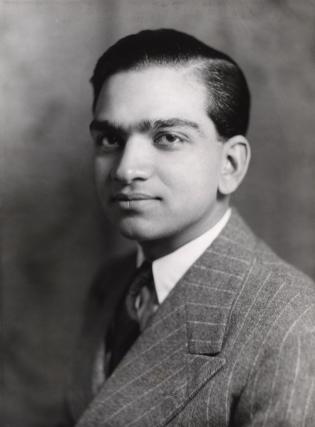
A princely state was a nominally sovereign entity of the British Indian Empire that was not directly governed by the British, but rather by an Indian ruler under a form of indirect rule, subject to a subsidiary alliance and the suzerainty or paramountcy of the British crown.

Rajpramukh was an administrative title in India which existed from India's independence in 1947 until 1956. Rajpramukhs were the appointed governors of certain Indian provinces and states.

Madhavrao Jiwajirao Scindia was an Indian politician and minister in the Government of India. He was a member of the Indian National Congress. He was viewed as a potential future prime ministerial candidate before the 1999 Lok Sabha elections in the aftermath of the controversy over Sonia Gandhi's foreign origin.

Gaj Singh II, known as 'Bapji', is the titular Maharaja of Jodhpur since 1952, as well as an Indian politician and diplomat.

The maharaja of Mysore was the king and principal ruler of the Kingdom of Mysore and briefly of Mysore State in the Indian Dominion roughly between the mid- to late-1300s and 1950. The maharaja's consort was called the maharani of Mysore.
In India, a privy purse was a payment made to the ruling families of erstwhile princely states as part of their agreements to first integrate with India in 1947 after the independence of India, and later to merge their states in 1949, thereby ending their ruling rights.

Major General Maharaja Sawai Governor Sir Man Singh II GCSI GCIE was an Indian prince, government official, diplomat and sportsman.

Brigadier Maharaja Sawai Bhawani Singh MVC was an officer in the Indian Army and an entrepreneur.

Fatehsinghrao Prataprao Gaekwad II was an Indian politician, cricketer, and titular Maharaja of Baroda from 1951 until 1988. In the 26th amendment to the Constitution of India promulgated in 1971, the Government of India abolished all official symbols of princely India, including titles, privileges, and remuneration.

Karan Singh is an Indian politician and philosopher. He is the titular Maharaja of the princely state of Jammu and Kashmir. From 1952 to 1965 he was the Sadr-i-Riyasat (President) of the state of Jammu and Kashmir. He is the chairperson trustee of the Dharmarth Trust of Jammu and Kashmir which maintains 175 temples in north India and works in other areas such as historical preservation.
Shrimant Tukoji Rao IV Pawar was an Indian politician belonging to the Bharatiya Janata Party (BJP). Mr. Pawar was member of the Legislative Assembly of Madhya Pradesh.
Ranjitsinhrao Gaekwad was an Indian politician.

Nawab Mohammad Mansoor Ali Khan Pataudi was an Indian cricketer and a former captain of the Indian cricket team.

Pataudi State was a small princely state in India, established in 1804 by the East India Company rule in India.

Padmanabh Singh is an Indian Polo player and member of the former royal family of the Jaipur State.

Bikaner State was the Princely State in the north-western most part of the Rajputana province of imperial British India from 1465 to 1947. The founder of the state Rao Bika was a younger son of Rao Jodha ruler of and founder of the city of Jodhpur in Marwar. Rao Bika chose to establish his own kingdom instead of inheriting his father's. Bika defeated the Jat clans of Jangladesh which today refers to the north and north-western Rajasthan along with his uncle Rao Kandhal and his adviser Vikramji Rajpurohit and founded his own kingdom. Its capital was the city of Bikaner.
Rao Nara, . Rao Nara was of Rathore lineage and the crown Prince of Nadol, the then small kingdom in northwest India in the 15th century. Nadol had been ruled by the Chauhans in the 11th to 14th centuries, but was taken over by the Rathores. His father was Rao Samra, the Raja (King) of Nadol. Rao Nara is significant in the history of India, as he plays a crucial role in the founding of Jodhpur, India in 1459 with Rao Jodha.

Shri Maharana Sir Bhupal Singh Bahadur KCIE, also spelt Bhopal Singh, was the ruler of the Indian princely state of Udaipur from 1930 and also Rajpramukh of Rajasthan from 1948 until his death on 4 July 1955.
The Domestic policy of the Indira Gandhi government was the domestic policy of India from 1966 to 1984 during the premiership of Indira Gandhi until her assassination in 1984. Designed to covers a wide range of areas, including to increased focus on developing national security, social welfare, economic and social affair, money and taxes.














